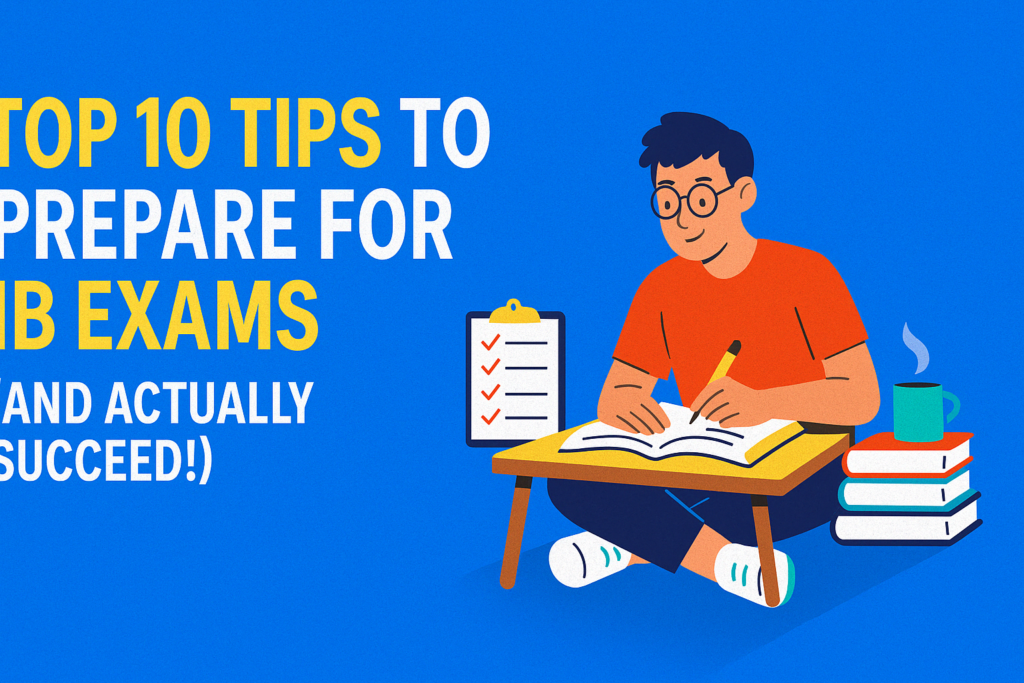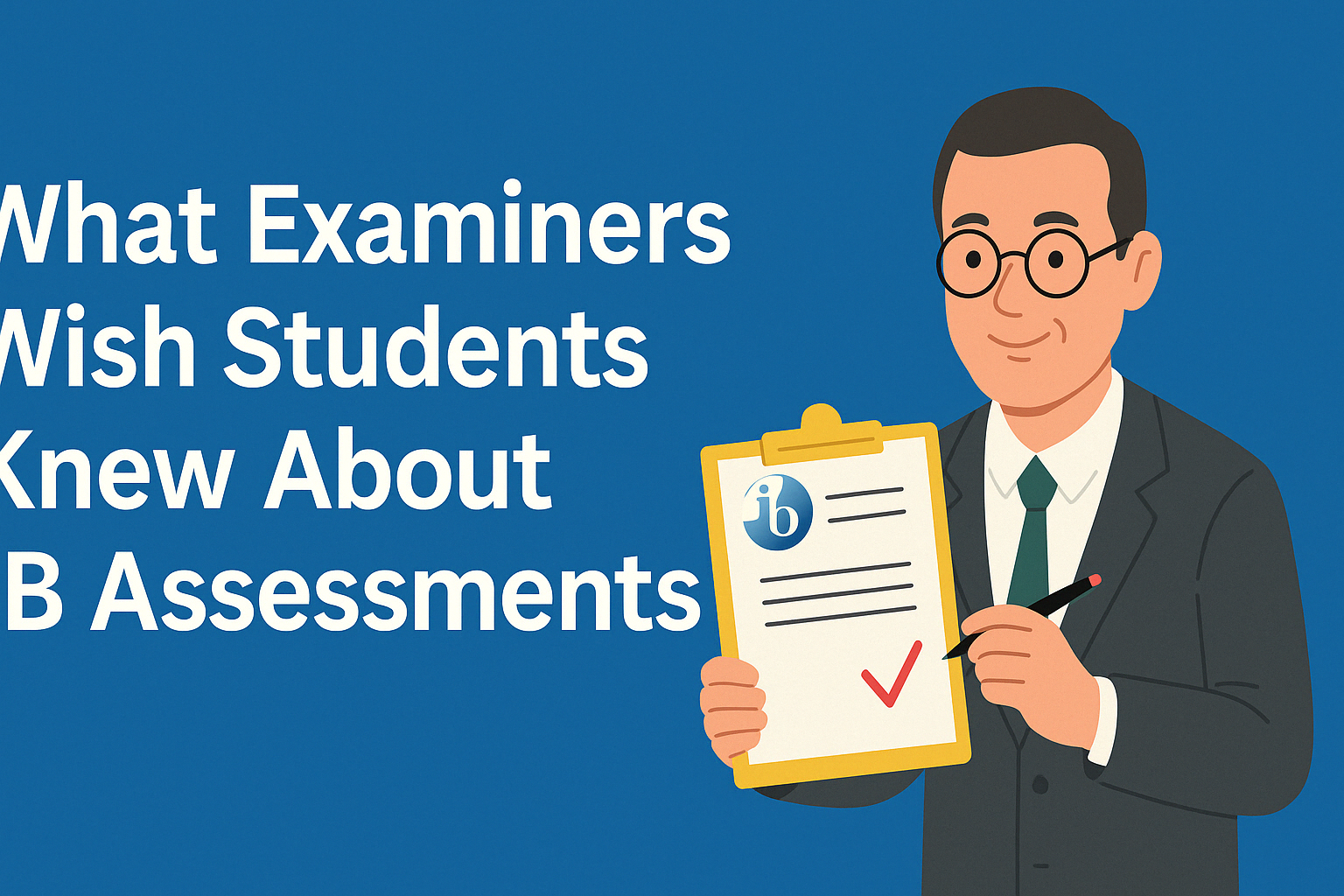Introduction: Feeling the IB Exam Stress? You’re Not Alone.
If you’re in the IB Diploma Programme (DP) or Middle Years Programme (MYP), chances are you’ve felt overwhelmed during exam season. The workload. The deadlines. The pressure to perform. It’s a lot.
But here’s the good news: you don’t have to wing it. With smart strategies, effective planning, and the right mindset, you can conquer the IB exams—and come out stronger.
This guide shares our Top 10 proven tips on how to prepare for IB exams, designed to make your study journey smoother, more efficient, and a whole lot less stressful.
Let’s dive in.
1. Start Early & Create a Study Plan That Works
Why it works: Starting early gives you enough time to review everything without cramming. A plan keeps you focused and accountable.
How to apply it:
Create a simple IB study plan with blocks for each subject and topic. Use a calendar or planner to break it down into weeks and days. For example:
Week 1: Math IA & core algebra review
Week 2: History past paper + English Paper 2 essay practice
Week 3: Biology HL flashcards + TOK reflection
✅ Pro Tip: Use tools like Notion, Trello, or Google Sheets to create a flexible, color-coded planner.
2. Understand the IB Assessment Criteria
Why it works: You can’t hit the target if you don’t know what it looks like. Understanding rubrics and command terms gives you clarity on what examiners expect.
How to apply it:
Review IB subject guides from your teachers or ibo.org.
Study the command terms like Evaluate, Justify, or Compare.
Look at IA and EE rubrics—highlight keywords like “analysis”, “coherence”, “structure”.
✅ Pro Tip: Practice writing your own answers using the command terms and grading yourself with the rubric.
3. Use the IB Syllabus as Your Roadmap
Why it works: The IB syllabus tells you exactly what you need to know—nothing more, nothing less.
How to apply it:
Get your syllabus from the IBO website or your teacher.
Turn it into a checklist and tick off each topic as you study.
Mark areas you’re weak in and review those first.
📌 Related keyword: IB curriculum explained
4. Practice with Past Papers & Mark Schemes
Why it works: Past papers show you how questions are framed, and mark schemes reveal what earns points.
How to apply it:
Download past papers from IB resources sites or your school portal.
Time yourself under exam conditions.
Cross-check your answers with the mark scheme and note patterns in what’s rewarded.
✅ Pro Tip: Look for examiner reports—they reveal common mistakes and insights from previous years.
5. Use Active Recall & Spaced Repetition
Why it works: These are two of the most effective IB revision techniques based on brain science. You retain more in less time.
How to apply it:
Use flashcards (physical or digital via Anki or Quizlet).
Practice recalling information, not just re-reading.
Space your review over days or weeks for long-term memory.
Example: Review Chemistry terms on Monday, again on Thursday, then again the next week.
📌 Keyword: IB revision tips
6. Balance All Subjects (Even the Ones You Like Least)
Why it works: Focusing too much on one subject can lead to underperformance in others—especially in IB where all subjects matter.
How to apply it:
Assign study time based on subject weight and your current grade.
Create a rotation: e.g., Monday = HL Bio + SL Math, Tuesday = English + TOK.
✅ Pro Tip: Don’t forget to revise for CAS reflections, EE deadlines, and IA submissions.
7. Master Time Management During the Exam
Why it works: You might know the answer—but if you can’t finish the exam in time, it won’t count.
How to apply it:
Use timed mock tests to simulate exam conditions.
Practice writing essays in 45 minutes or solving Paper 1 questions in 90 minutes.
Use Pomodoro technique for study sessions (25 minutes study + 5 min break).
✅ Pro Tip: On exam day, bring a watch and plan how many minutes to spend per question.
8. Collaborate with Peers (The Right Way)
Why it works: Study groups can provide motivation, fresh perspectives, and peer teaching, which improves retention.
How to apply it:
Set up a weekly Zoom session or in-person meetup.
Focus on specific tasks: “Let’s quiz each other on Biology,” or “Group-mark each other’s Econ essays.”
Avoid distractions—agree on a 1-hour focused session.
✅ Pro Tip: Try the “teach back” method—take turns explaining concepts to each other.
9. Prioritize Mental Health, Sleep, and Breaks
Why it works: Your brain needs rest to function. Sleep consolidates memory. Burnout leads to forgetting even what you do know.
How to apply it:
Aim for 7–9 hours of sleep, especially before exam day.
Take screen-free breaks every 60–90 minutes.
Stay active with walks, yoga, or even dancing—it boosts focus and mood.
✅ Pro Tip: Don’t skip meals or overload on caffeine. Keep snacks and water nearby.
10. Ask for Help When You Need It (No Shame!)
Why it works: Struggling alone can slow you down. Seeking help accelerates learning and reduces stress.
How to apply it:
Email your teachers with specific questions.
Use online platforms like IB resources Reddit, HeLovesMath.com, or hire a tutor for targeted support.
Attend review classes, school workshops, or peer tutoring sessions.
✅ Pro Tip: Use AI tools or study apps responsibly to clarify doubts—not to shortcut your learning.
🔥 Bonus: Top Mistakes to Avoid
❌ Cramming the night before – It leads to short-term memory and panic.
❌ Ignoring Internal Assessments (IAs) – They carry significant weight.
❌ Skipping examiner feedback – You’re missing golden insights from past papers.
✅ Conclusion: You’ve Got This. Now Pick 2 Tips and Start Today!
Preparing for IB exams doesn’t have to feel impossible. With the right tools and mindset, you can succeed—and stay sane doing it.
🎯 Choose 2–3 tips from this list and implement them this week. Whether it’s building your study plan, revisiting past papers, or joining a study group—action beats perfection.
📥 What’s Next?
✅ Download our free printable IB Study Planner
✅ Subscribe for weekly IB revision tips and guides
✅ Read more:
💬 Got a tip that works for you? Share it in the comments—we’d love to hear from you!
Would you like a feature image, Pinterest-style checklist, or printable planner to go with this post? I can create those for you right away.




